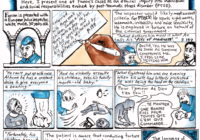Reflections on the Boom of Graphic Pathography: The Effects and Affects of Narrating Disability and Illness in Comics
Wegner, G. (2019). Reflections on the boom of graphic pathography: the effects and affects of narrating disability and illness in comics, Journal of Literary & Cultural Disability Studies. Retrieved from https://online.liverpooluniversitypress.co.uk/doi/abs/10.3828/jlcds.2019.18 ABSTRACT: Over the past decade, autobiographical comics that focus on experiences of illness and disability—a genre also known as “graphic pathography”—have not only received… Read More »
